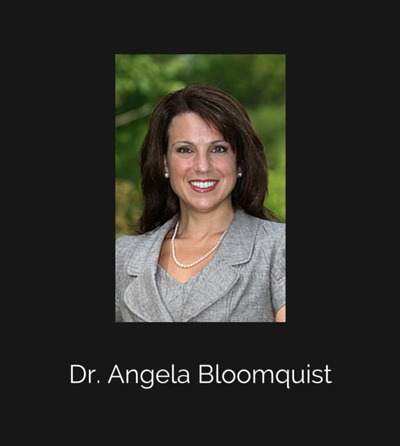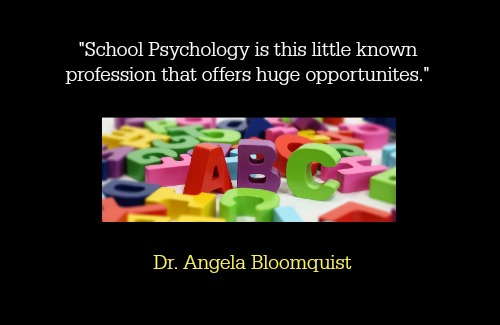Interview with Dr. Angela Bloomquist
Want To Study Psychology?
Angela Bloomquist, Ph.D., is Associate Professor of Psychology and program coordinator for the graduate-level school psychology master of science and certification program at the California University of Pennsylvania. A certified school psychologist with over a decade of field experience, Dr. Bloomquist presents in-service training programs to local educators on a variety of topics related to school psychology and serves as a National Association of School Psychologist (NASP) program reviewer for school psychology graduate programs across the United States.
Dr. Bloomquist is also the host and educational consultant for "Meet Me at the Great Tree," an original children's television program produced by the National Network of Digital Schools, designed to get preschool and kindergarten children excited about learning and literacy.
Q & A
What led you to pursue a career in school psychology?
As a psychology major, I worked my way through college teaching dance classes to school-aged children. I also served as a research assistant in the preschool setting. Through these endeavors, I found that I really enjoyed working with kids. I also faced the sobering reality that if I wanted to be able to support myself financially, I was going to have to pursue a graduate degree, but was not sure which branch of psychology would be the best fit or me.
The psychology department of my University sponsored a job fair, where I was first exposed to the field of school psychology. I learned that school psychologists work to help kids succeed academically, behaviorally and emotionally. This fell in line with my interests, so I researched the discipline further and applied to graduate school.
What is the difference between a school psychologist and a child psychologist?
|
Typically, the term "child psychologist" refers to doctoral-level clinical psychologists who specialize in children. "School psychologist" specifically refers to professionals who bridge psychology and education to address school-related issues, including those that concern children, teachers, parents and families, as well as school organizations. Both school psychologists and child clinical psychologists need strong backgrounds in child development and psychology. Clinical psychologists' training generally does not include study of school organization, instruction, classroom management, special education or special education law and ethics. School psychologists' training does include study in education and special education, but compared to clinical psychology, there will likely be less emphasis on psychopathology and long-term therapy. |
|
Most states will only license private practice at the doctoral level; while most states credential school psychologists at the specialist level (60 graduate semester credit master's degree).
School psychologists are typically found in a school setting although a few may work in clinic or hospital settings that specialize in treating school-age children and school-related problems. Child clinical psychologists are typically found in hospitals, mental health centers, and private clinic settings. The school psychologist is much more likely to be involved in services intended to prevent mental health problems and severe behavior disorders, or to intervene at early stages to prevent more serious problems. They are also far more likely to work with teachers and parents to improve instruction in the classroom.
You've stated that school psychology offers huge career opportunities. Why do you think this is the case?
The job outlook is very promising for school psychology nationwide. It is believed that a majority of current practitioners will be reaching retirement age within the next ten years, hence opening the door for a new generation of school psychologists.
Additionally, according to the 2014 US News and World Report School Psychologist ranked #1 on their list of Best Social Services Jobs and on their ranking of the 100 Best Jobs in general, school psychologist ranked #31.
Why is this? Three reasons:
1) The Bureau of Labor Statistics reports that, in 2014, the average annual salary of a school psychologist is $72,220! The best paid school psychologists are pulling down $109,340. Some school psychologists work a 10 month teacher-contract, some work a 12 month administrator- contract. The length of contract, including vacation days, varies by institution.
2) The Bureau of Labor Statistics also estimates that 16,400 new school psychologist jobs will be added between now and 2022. That is an employment growth rate of 11%.
3) School psychologists consistently report high levels of job satisfaction.
So the pay is terrific, people find this work to be rewarding AND, there are jobs to be had! Right now, there is actually shortage of school psychologists (and professors of school psychology) so the unemployment rate is very low.
What educational requirements are needed in order to practice as a school psychologist?
School psychologists are highly trained in both psychology and education. They complete a minimum specialist-level degree program that includes a year-long supervised internship (1200-1500 clock hours). Typically, this involves earning a master’s degree plus about 30 more credits. For full time students, this translates into 2 years of graduate level course work and one academic year of working alongside a certified school psychologist as an intern. So, three years of graduate education until they are able to practice school psychology.
There are also doctoral programs in school psychology, which take a bit longer. All school psychologists (specialist and doctoral level) must be certified and/or licensed by the state in which they work. They also may be nationally certified by the National School Psychology Certification Board (NSPCB), but that is not a required credential to work in the field.
Among your academic roles you are the graduate coordinator of the school psychology program at the California University of Pennsylvania. In order to provide some insight for anybody considering studying school psychology, could you tell us something about the nature of this program?
School psychology training brings together the knowledge base of several disciplines, including child psychology, human development and education with an emphasis on special education. A school psychologist’s first responsibility is to the population of students at risk for failure. Thus, training programs prepare candidates for their roles in assessment (comprehensive evaluations of disability and risk), consultation regarding instructional and behavioral interventions, and direct interventions including crisis prevention/intervention, individual and group counseling and skill training. In this latter role, school psychologists may overlap the duties of counselors and social workers, and often will work jointly with these other professionals by co-leading social skills groups and jointly serving on crisis, academic or behavioral support teams.
At California University of Pennsylvania, full-time students register for 3 classes each semester (9 credits). A typical schedule involves classes meeting three evenings a week, never on Fridays. Some classes are offered on-line, but most are offered in the face-to-face medium. Courses are grounded in the "science practitioner model" and much of the training is focused on applying knowledge out in the field through practicum experiences. Our students also have the benefit of working with real clients in our on-site School Psychology Clinic is a part of the curriculum. For more information, please see following link to visit our website.
School Psychology at the California University of Pennsylvania
Recent Articles
-
Tourettes: Understanding Tourette Syndrome Beyond Stereotypes
Feb 23, 26 06:01 AM
Learn what tourettes really is, why swearing is a myth for most, and how education reduces stigma around Tourette syndrome. -
Psychological Impact of Catastrophic Injury & Recovery
Feb 17, 26 02:26 AM
Explore the psychological impact of catastrophic injury, including trauma, identity shifts, resilience, and long-term mental health recovery. -
Psychology Articles by David Webb
Feb 10, 26 06:31 AM
Discover psychology articles by David Webb, featuring science-based insights into why we think, feel, and behave the way we do.
New! Comments
Have your say about what you just read! Leave me a comment in the box below.Go Back To The Psychology Expert Interviews Page







New! Comments
Have your say about what you just read! Leave me a comment in the box below.